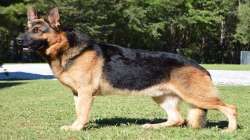'Scientists training dogs to sniff out COVID-19 in humans'
Scientists in the US say they are training dogs to identify COVID-19 in humans by sniffing out the disease in saliva and urine samples.

Scientists in the US say they are training dogs to identify COVID-19 in humans by sniffing out the disease in saliva and urine samples. According to the researchers at the University of Pennsylvania's School of Veterinary Medicine (Penn Vet) in the US, the training programme will utilise scent detection dogs to discriminate between samples from COVID-19 positive and COVID-19 negative patients.
With up to 300 million smell receptors -- compared to six million in humans -- dogs are uniquely positioned to aid in disease detection, they said in a statement.
The study -- that will explore the sensitivity and specificity of scent -- sets the stage for dogs to be a force multiplier in the mission to detect COVID-19, particularly among asymptomatic patients, or hospital or business environments where testing is most challenging, according to the researchers.
Preliminary screening of live humans by trained dogs could begin as early as July, they said.
"Scent detection dogs can accurately detect low concentrations of volatile organic compounds, otherwise known as VOCs, associated with various diseases such as ovarian cancer, bacterial infections, and nasal tumours.
These VOCs are present in human blood, saliva, urine or breath," said Cynthia Otto, a professor at Penn Vet.
"The potential impact of these dogs and their capacity to detect COVID-19 could be substantial," Otto said in a statement.
The researchers will initially begin the study with eight dogs to perform this precise detection work.
Over the course of three weeks through a process called odour imprinting, the dogs will be exposed to COVID-19 positive saliva and urine samples in a laboratory setting, they said.
Once the dogs learn the odour, the researchers will document that the dogs can discriminate between COVID-19 positive and COVID-19 negative samples in a laboratory setting, establishing the platform for testing to determine if the dogs can identify COVID-19 infected people.